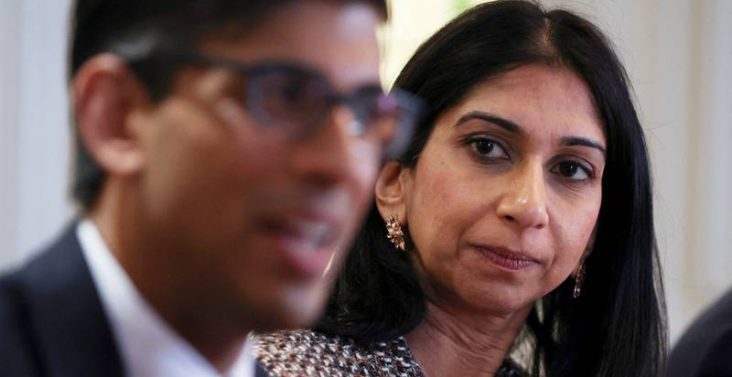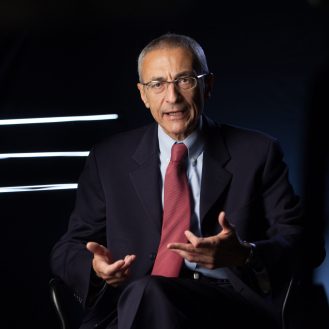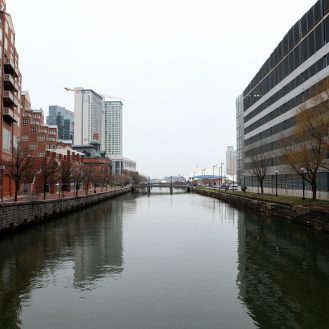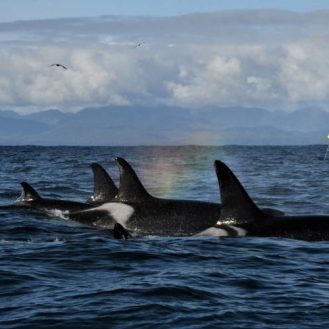CULTURE
From ‘The Science Guy’ to ‘The End is Nye’
Bill Nye has come a long way from his 1990s kids’ science education program.
His new miniseries, “The End is Nye,” all six episodes of which premiered this week on Peacock, features a visual feast of digitized planetary disasters like hurricanes, earthquakes and volcanic eruptions. The famous “Science Guy” succumbs to each crisis, then walks back to see how it could have been prevented or how society could have been better prepared.
The show, created by Nye and the likes of “Family Guy” creator Seth MacFarlane, describes how several of the fictional disasters were made worse by climate change. Nye explains not only the science of each calamity but the societal factors that make the event even worse, like government officials who delay action until it’s too late or people who disregard warnings to evacuate.
The goal of the show is to “change the world,” Nye told Al Roker on the Today Show this week, and getting people to “think about an optimistic view of the future with science where we anticipate these global problems and do something about them.”
CULTURE
What Bottled Water Says About Trust in Government
Trust in government has plummeted since 2000. Bottled water consumption has skyrocketed since then. This is not a coincidence, argues Manny Teodoro, an assistant professor at the University of Wisconsin, Madison, in his new book.
“The Profits of Distrust” is out this month, coauthored with Samantha Zuhlke of the University of Iowa and David Switzer of the University of Missouri, Columbia. In it, the authors make the case that more people are turning to bottled water and water dispensed at privately operated kiosks, which is more expensive and less regulated than municipal tap water, because of a lack of trust in the government to provide safe and clean drinking water. This is especially true for communities of color and low-income communities, the authors write, and is a microcosm of a much bigger story about how corporations are the ones benefiting from this waning trust.
Inside Climate News recently discussed the book with Teodoro. This conversation has been lightly edited for length and clarity.
How is bottled water a lens into bigger issues in our society?
The EPA regulates your tap water. The Food and Drug Administration regulates your bottled water, but that regulation is much looser. There’s no public reporting requirement. So when you drink a bottle of bottled water, you are effectively putting your faith in a corporation, the corporation that produced the bottle, put the water in the bottle, put it on a truck, sent it to a store, and the store that sold it. You’re putting your faith in that long line of commercial enterprises more than you’re putting your faith in the government.
And it’s the ultimate act of trust. Water is the most intimate relationship we have with government. We’re talking about a government-regulated service that flows into your home 24 hours a day. You immerse your children in it, you take it into your body. It’s an act of faith to drink water, and the fact that people are choosing bottled water or commercial kiosks’ water instead of tap water, it’s a very powerful demonstration that people have more faith in a commercial product than they have faith in the more rigorously regulated, publicly accountable tap water product.
Did this begin with the Flint water crisis?
Flint wasn’t the first, wasn’t the worst, wasn’t the biggest drinking water failure. But it is the one that caught the public imagination. I could not tell you why. What’s fascinating is that the Flint water crisis changed Americans’ perceptions of tap water everywhere, not just people in Flint, not just people in Southeast Michigan, but people across the United States started thinking differently about their tap water because of the Flint water crisis. Every time there’s a water main break on your street, every time your town has a boil water notice, it’s a little bit of an erosion, a little bit of a chip, a little bit of an undermining of trust and government.
Black and Hispanic people and low income people tend to consume more bottled water. What’s the argument you make for why that is?
We think that has to do with trust. We think that people who do not trust governments will not trust tap water because they don’t trust the regulators who are responsible for the safety, they don’t trust the government-run utilities that are responsible for providing that service, and at an even deeper level, they don’t trust those same institutions to be responsive to their needs.
If you don’t feel trust, you have two choices. You can either turn to government, and in a democracy they’re supposed to respond to your needs. Your other choice is to forego that and just turn to a commercial alternative. Now getting back to racial and ethnic minorities, if you belong to a group of people—racially, ethnically, socioeconomically—that is alienated from government, that has historically not been represented in government, you’re not crazy to believe that government is not going to respond to your needs. You’re rational to believe that. Why would I bother trying to convince [the government] to do something if I believe that [the government is] fundamentally hostile to me and my kind? I’d be much better off by spending 200 times as much on a commercial product because at least I know what I’m getting, or I think I know what I’m getting.
How is the lack of trust in government a problem for solving climate change?
Attempts by governments to address climate change is by definition, a long-term project. It’s not going to matter today. It’s not going to matter next year. It’s gonna matter decades from now, when you and I might be dead. So it only makes sense for us to support those kinds of policies if we believe in the institutions that are going to carry them out. So, to the extent that people have lost faith in these institutions, they’re going to lose faith in the ability of those institutions to accomplish big things.
The government has to get the basics right. Because if citizens don’t trust their government to do the small thing, not that drinking water is small, but it’s immediate. So if you can’t get this one thing right that’s relatively technologically simple, how am I supposed to believe that you’re going to tackle something as monumentally difficult as climate change?
SOLUTIONS
Blacktop’s Cooler, Colorful Future
A school in an Atlanta suburb coated its dark blacktop playground area with a brightly colored reflective coating this week. The coating prevents heat from solar radiation from being absorbed into the play surface and can reduce its temperature by 10 to 12 degrees Fahrenheit.
The SAE School, a private institute for kids in kindergarten through 8th grade, is located in Cobb County, Georgia, which is just north of Atlanta. The county could see a whole month of days with temperatures exceeding 100 degrees Fahrenheit, a recent study showed, which is twice as many as what it currently experiences.
These sweltering temperatures can feel even hotter to kids playing on heat-absorbing surfaces like asphalt. That’s why the SAE School partnered with the company StreetBond to coat its blacktop with a vibrant design inspired by student input that includes the school’s mascot—a dragon.
“This was an exercise not only about just reducing the temperature, but it’s about the colors and creating a space,” said Eliot Wall, general manager for StreetBond.
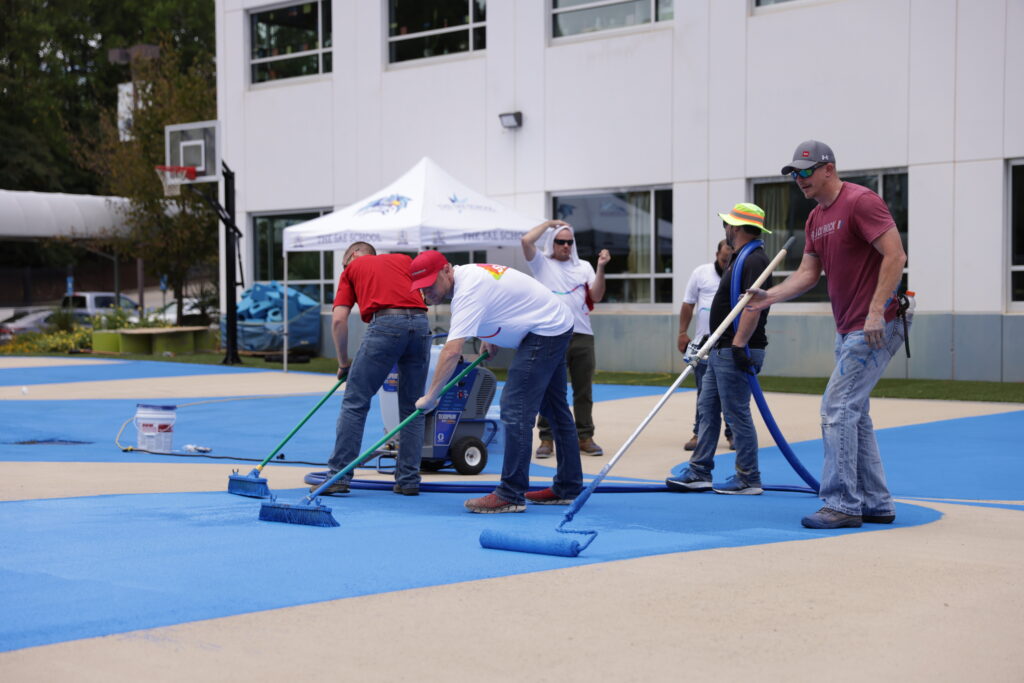
The reflective coating contains an additive that reflects visible and infrared light to keep the surface cool, Wall said, and has been applied to playgrounds at 130 schools around the country. Students at the SAE School took handheld thermometers to the blacktop before and after the project to see for themselves how significant the temperature difference was.
“Research has shown, of course, when you change from a blacktop, which can be really, really hot in the summer and not particularly fun to play on, to these colorful spaces that are cooler, it actually encourages kids to go out and play more,” Wall said. “So there’s a physical benefit of them actually playing more.”
SCIENCE
Pollinator Interactions: in the Weeds
If you enjoy seeing butterflies in your garden and want to plant flowers that will attract them, what species should you plant? If you’re in the United Kingdom, a new database contains answers, and similar repositories are being developed in other countries.
The Database of Pollinator Interactions is a new compilation of more than a century of scientific literature documenting thousands of interactions between pollinators and plants. Built by scientists at the University of Sussex, the database will be useful for researchers who study ecological interactions, beekeepers, agronomists and even amateur gardeners wanting to support insects that are facing declines due to climate change and habitat loss.
Before this database, Sussex researcher Nicholas Balfour said this information was not readily available. Some studies and data sets were hard to find and time-consuming to comb through. The database now makes this information easily searchable through its website.
“We’ve got stuff going all the way back to the 1800s,” he said. “And, of course, the names of species changed over the years. Some of that was quite difficult to resolve. Some of the data is just buried in supplementary material within papers, or they might just be sitting on someone’s computer, which, you know, there’s no way to publicly access that, so this was a way to bring together all these things which were so disparate.”
Keep Environmental Journalism Alive
ICN provides award-winning climate coverage free of charge and advertising. We rely on donations from readers like you to keep going.
While developing this database, Balfour said he learned that many plant species pollinators rely on are considered weeds that people pull or mow. He suggests that people leave at least some of their lawn to grow and let pollinators feast on the weedy flowers that grow.
Groups in Canada and the United States have been in touch with Balfour to develop similar databases in their countries, he said, and someday he hopes to combine all this international data into an enormous repository that documents all the known interactions that form the web of pollination.

